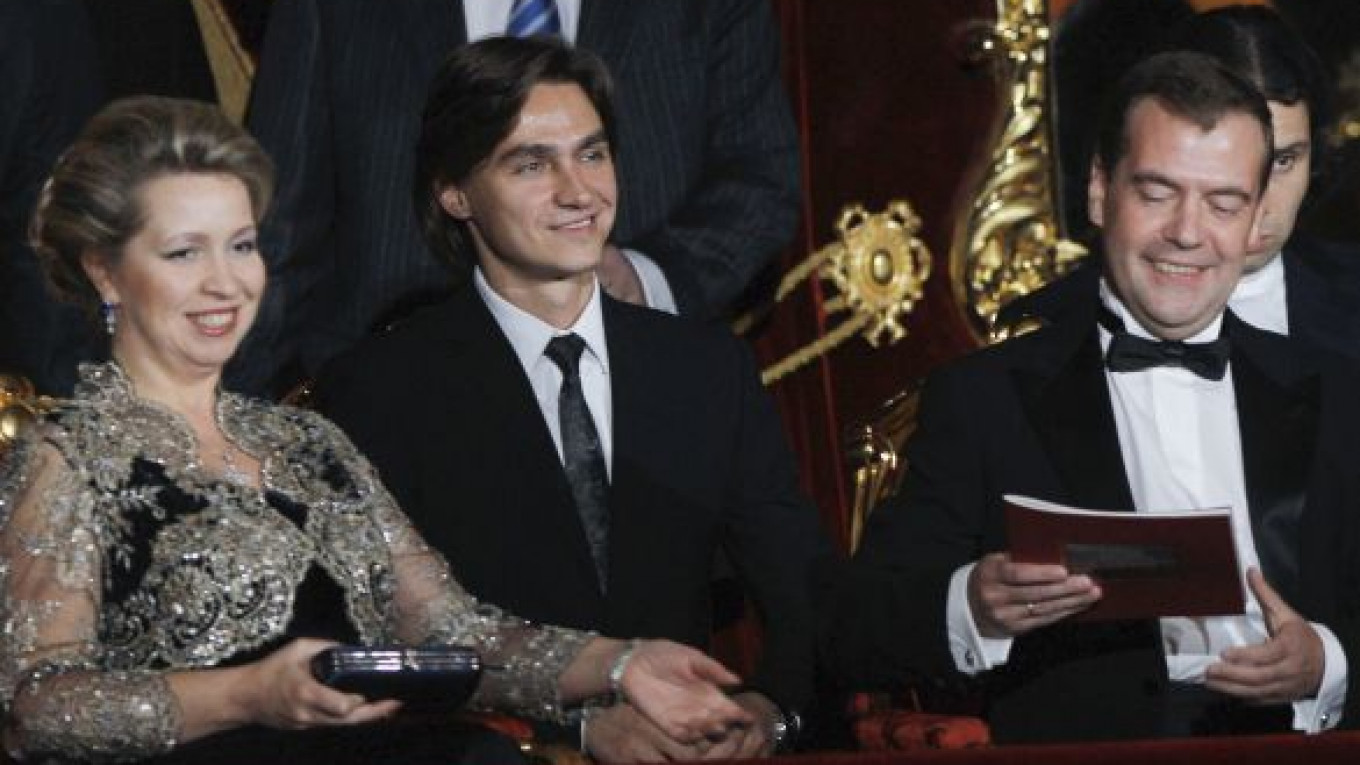In his since a horrific acid attack, Bolshoi Theater artistic director Sergei Filin described how he tried to flee but was overpowered by an attacker who splashed the acid in his face.
Filin underwent emergency surgery on his eyes at City Hospital No. 36. Doctors said Saturday that he would not be left blind, although any permanent injuries would not be clear until next month.
An unknown assailant attacked Filin, 42, near his central Moscow apartment building shortly before midnight Thursday, police said. The perpetrator fled and remains at large.
Filin said he frantically tried to open the gate leading into his apartment building and escape from the attacker, but the pass code didn't work.
"To be honest, I thought they would fire at me" Filin, speaking from a hospital bed, his face bandaged, said on Ren-TV after the operation Friday.
"And I saw that the gate didn't open with the code," he said. "I turned to run, but he was faster. I was wearing a hood. From below, he splashed acid into my face."
Police suspect that Filin was splashed with sulfuric acid, Interfax reported Sunday. Sulfuric acid, which is highly corrosive and can severely burn the skin, is used mostly in the production of fertilizer, but it can be found in other products, such as detergents, insecticides and antifreeze.
Filin said he felt certain that the attack was linked to his work.
"Someone is displeased that I am successfully leading the Bolshoi Theater," he said.
As the Bolshoi's artistic director, Filin chooses the theater's repertoire and appoints ballet dancers, among other things.
Bolshoi spokeswoman Yekaterina Novikova said unknown people had been threatening Filin. No witnesses have come forward with information about the attack.
Filin will need another eye surgery in the next few days, and it will be clear in about two weeks whether and to what extent his eyesight has deteriorated because of the attack, said Alexander Mitichkin, chief doctor at City Hospital No. 36.
Although Filin can see, his eyes are covered with a bandage so they can heal, the doctor said, according to Interfax.
Filin was transferred from the intensive care unit to an ordinary ward over the weekend and is able to walk around and eat on his own.
The motive for the attack remained unclear as of Sunday, although police agreed with Filin that it was probably linked to his work.
Former Bolshoi ballerina Anastasia Volochkova said the attack was "all about corruption in the Bolshoi Theater," noting that investigators have said state funds were during the theater's recent renovation.
Moscow investigators opened a criminal case in September 2009. No suspects have been identified publicly, and the case has not been sent to trial.
Volochkova didn't elaborate on how Filin, who became the Bolshoi's artistic director in March 2011, might be connected to the years-long reconstruction, which ended in October 2011.
State Duma Deputy Maxim Rokhmistrov speculated that Filin had "trodden on the interests of the mafia that flocks around the Bolshoi Theater."
Filin's father-in-law, Alexander Prorvich, suggested that someone wanted to take Filin's job.
But several psychologists said the attack resembled a personal vendetta rather than a work-related problem. Criminal psychiatrist Mikhail Vinogradov said the attack was "definitely" linked to Filin's private life because if someone had wanted Filin's position, they would have found a simpler way to get him out of the way.
Filin joined the renowned Bolshoi ballet troupe in 1988 and performed there until 2008, when he hung up his shoes to become the artistic director of Moscow's Stanislavsky and Nemirovich-Danchenko Musical Theater.
Filin received the title of National Artist of Russia, one of the state's highest honors, in 2001, according to the .
Contact the author at n.krainova@imedia.ru
Staff writer Rachel Nielsen (r.nielsen@imedia.ru) contributed to this report.
Related articles:
A Message from The Moscow Times:
Dear readers,
We are facing unprecedented challenges. Russia's Prosecutor General's Office has designated The Moscow Times as an "undesirable" organization, criminalizing our work and putting our staff at risk of prosecution. This follows our earlier unjust labeling as a "foreign agent."
These actions are direct attempts to silence independent journalism in Russia. The authorities claim our work "discredits the decisions of the Russian leadership." We see things differently: we strive to provide accurate, unbiased reporting on Russia.
We, the journalists of The Moscow Times, refuse to be silenced. But to continue our work, we need your help.
Your support, no matter how small, makes a world of difference. If you can, please support us monthly starting from just $2. It's quick to set up, and every contribution makes a significant impact.
By supporting The Moscow Times, you're defending open, independent journalism in the face of repression. Thank you for standing with us.
Remind me later.






